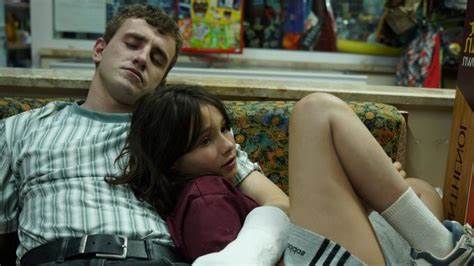
29 Jan Aftersun: An Understated and Deeply Human Exploration of Memory
By Arman Saxena
The film opens with a scene filmed on a digital home video camera. One of those cheap cameras that have given me a glimpse back into a past I never experienced. My family’s Y2K party, my older cousin’s feverish dancing on her fourth birthday, my parents doing karaoke on a snowy winter day. This first scene in Aftersun reminded me of those windows into the past, generating a weird nostalgia, a combination of joy for seeing those I love happy and a sense of melancholy that these moments are far gone. And like Aftersun, these videos don’t seem like the movies, everything does not go to plan: an uncle almost runs into the camera, moments are focused on for longer than you might expect, and a cousin kicks her sister while she’s dancing. These videos are oftentimes solely just snapshots of moments in lives. The event that brings their characters together may be of note but many of the moments that fill the time are completely ordinary. Then why are they so captivating? Why have I spent hours and hours looking back at the scenes of my aunt and uncle talking about nothing in particular, my cousins singing off-key, and the silly puns my dad has been making for apparently over 20 years? I don’t really have an answer to that question but I think the things that don’t go to plan, that seem out of place, are what keep me coming back.
At least that is what’s compelling about Aftersun. In the first scene, a girl films a man who is presumably her father (played spectacularly by the Oscar-nominated Paul Mescal) sillily dancing in a bathroom. The girl says “That’s so embarrassing!” and as the father starts to move out of frame, she asks to interview him. “When you were eleven, what did you think you would be doing now?” His hand is on his face, he looks preoccupied, frazzled. He takes his hand off his face, looks at the girl with his hands on his hips as if saying, “I don’t want to talk about this right now”, but he stays silent. As he begins to turn away, the image freezes. There is a woman in what appears to be a club with strobe lights. She stands out, motionlessly standing on the dance floor, eyes shut. And then we cut back to the home video footage, this time from the father’s perspective as his daughter waves goodbye to him at an airport.
Director Charlotte Wells and her editor Blair McClendon (who rightfully won best editing for their work from the Los Angeles Film Critics Association) use the effect of fast forwarding through footage on a cheap video camera to great effect, representing the elder Sophie’s search through her memories of her father.
These moments are what consist of the film’s first two minutes but essentially outline what the film will be: a deeply human exploration of the moments we don’t realize we want to hold on to until it’s possibly too late. The film, however, does not just focus on Sophie’s time with her father. We see the flutters of first love, the occasionally awkward time spent with pubescent teenagers, and moments of exploration and discovery. All of these are hallmarks of coming-of-age cinema but Aftersun never feels like it’s following overdone tropes. Nothing feels artificial or contrived and this is a combination of the phenomenally naturalistic performances from Paul Mescal and newcomer Frankie Corio, Wells being unafraid to let sequences and shots linger, and Wells’ writing that never feels twee yet simultaneously endears us to Sophie’s sweetness. Mescal, especially, is fantastic. As his character’s mental state slowly unravels over the course of the film, Mescal never gives everything away, the Irish actor displaying that inner conflict that every parent knows between wanting to be honest with your child and yet always making sure they feel safe and comfortable. In a single scene, Mescal can be at once distant and loving, attentive but preoccupied, dancing at one moment and in silent frustration the next. This is my favorite male performance of 2022. Corio is fantastic as well, not many young actresses could deliver “I think it’s nice we share the same sky” and have it come off completely sincere.
All in all, that’s what I love about this film, how sincere it feels. Wells is deeply committed to the art of “show don’t tell”, allowing McClendon’s editing to help the audience decipher the location jumps and non-linearity of the storytelling. But while the film’s progression is not obvious it is never confusing and the emotional progression of the film is deeply felt. Nothing feels manipulative and the audience is never told how to feel. Some may come out of the film wondering why they spent an hour and a half watching a father and daughter spend their vacation together but I believe the majority of viewers will take away what I took away or something near it: an inspiration to cherish the moments we have because even the most commonplace of seconds can be home to profound beauty.
Rating: 4.5/5
